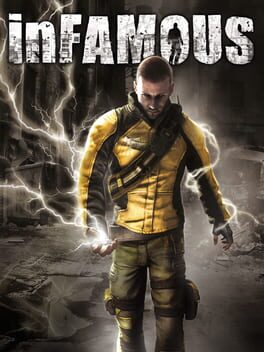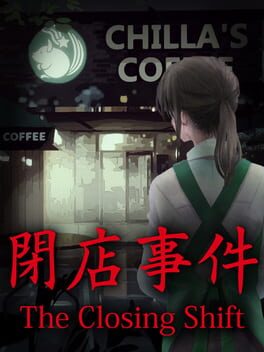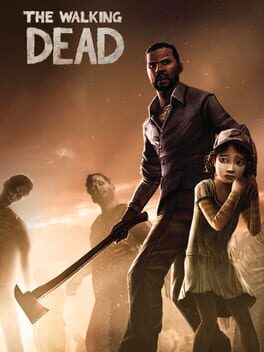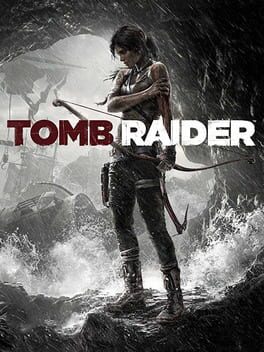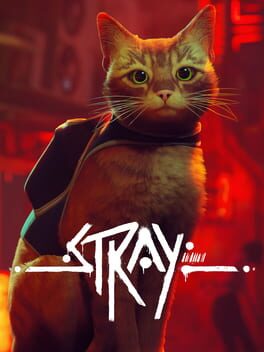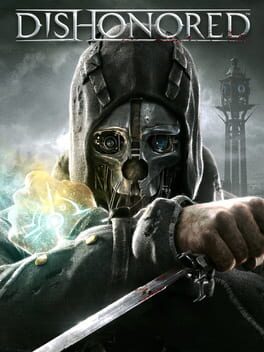ShinxBasedTakes
265 Reviews liked by ShinxBasedTakes
Infamous
2009
Why don't people talk about inFAMOUS much anymore? The game definitely had its problems but man this game is cool and one of the defining open-world action games for the PS3.
Zipping around the city as Cole and blasting foes with electricity played excellently and it I liked all of the different abilities you unlock throughout the story. There is of course the decision to play the good or evil path which affects what you can do and encourages two play-throughs.
I really liked the story of inFAMOUS too which takes some massive swings that mostly pay off. I really didn't see the twist coming and while the story feels a little overconvoluted at times it maintained my interest to the credits and blew me away with the twist.
Now the gameplay did have some issues particularly with the traversal which could've been polished up but overall this was a good time. Sidenote- I played this as my free "apology game" after the PSN hack which took down the servers for like a month. Who remembers that?
Zipping around the city as Cole and blasting foes with electricity played excellently and it I liked all of the different abilities you unlock throughout the story. There is of course the decision to play the good or evil path which affects what you can do and encourages two play-throughs.
I really liked the story of inFAMOUS too which takes some massive swings that mostly pay off. I really didn't see the twist coming and while the story feels a little overconvoluted at times it maintained my interest to the credits and blew me away with the twist.
Now the gameplay did have some issues particularly with the traversal which could've been polished up but overall this was a good time. Sidenote- I played this as my free "apology game" after the PSN hack which took down the servers for like a month. Who remembers that?
God of War Ragnarök
2022
The Closing Shift
2022
Starfield
2023
The Walking Dead
2012
The Walking Dead
2012
Tomb Raider
2013
For a game that spends a lot of time talking about the sacrifices that needs to be done in order to survive, it sure does nothing to explore the emotional trauma and ramifications that comes with it. After Lara makes her first kill she reflects on how suprisingly easy it was for two seconds and then goes Rambo on the entire islands population for the next 12 or so hours. It's hard to take the game seriously when it faintly dabbles in moral dilemmas while also going on a murder spree without batting an eye.
Now since I played this 9 years after release, I can safely say that while it on a technical level held up better than I expected, it still showed it's age just slightly. It had some perfomance issues as it struggled a lot to hold a steady framerate. The animations where also very janky and lacked the overall realistic polish that most modern games have today. I swear, during some segments it felt like someone was fast-forwarding Lara's animations as she was speeding through her animations like she was Sonic.
It's a decent game that doesn't do a whole lot out of the ordinary. It plays it pretty safe and delivers a decently enjoyable adventure. The characters are about as thin as Lara Croft's original waist from the 90's and only acts as objectives for you to save. It's a pretty basic game that tries to be deep and morally complex while at the same time being fueled by loud explosions and joyous violence that drowns out all attempts at deep emotional reflection. Don't think, just shoot and have fun.
Now since I played this 9 years after release, I can safely say that while it on a technical level held up better than I expected, it still showed it's age just slightly. It had some perfomance issues as it struggled a lot to hold a steady framerate. The animations where also very janky and lacked the overall realistic polish that most modern games have today. I swear, during some segments it felt like someone was fast-forwarding Lara's animations as she was speeding through her animations like she was Sonic.
It's a decent game that doesn't do a whole lot out of the ordinary. It plays it pretty safe and delivers a decently enjoyable adventure. The characters are about as thin as Lara Croft's original waist from the 90's and only acts as objectives for you to save. It's a pretty basic game that tries to be deep and morally complex while at the same time being fueled by loud explosions and joyous violence that drowns out all attempts at deep emotional reflection. Don't think, just shoot and have fun.
Tomb Raider
2013
Stray
2022
Dishonored
2012
me: i am fundementally opposed to the monarchy and the church as ruling powers. history is a record of their atrocities
my therapist: that's fair
me: but i love it when the enemies of the heiress to the throne are slaughtered by her loyal protector, his once-gentle ways pushed to the brink by the betrayal he has endured, so that she may ascend to the title that was stolen from her and right the wrongs of her predecessors
my therapist: who doesn't
my therapist: that's fair
me: but i love it when the enemies of the heiress to the throne are slaughtered by her loyal protector, his once-gentle ways pushed to the brink by the betrayal he has endured, so that she may ascend to the title that was stolen from her and right the wrongs of her predecessors
my therapist: who doesn't
Dishonored
2012
Dishonored’s chaos system fascinates me. On the surface it’s a basic kill-counter, where actually using the fun lethal magic is punished with increased guard counts and a pessimistic ending, and this naturally rubbed a lot of people the wrong way. When given the ability to stop time, what people want to do is take down an entire squad all at once, queue up ten projectiles for when time resumes, move someone back down the stairs, and so on, not just sneaking past one particularly stubborn guard. When given the ability to summon a devouring swarm of rats, the idea isn’t to possess one and sneak it into a drain pipe, it’s to make an explosive and terrifying entrance. Dampening that enjoyment with negative consequences seems like an unambiguously bad move, but the narrative framing that surrounds it leads into an analytical hall of mirrors. These powers are granted by the Outsider, a manifestation of the indefinable void, and their reasons aren’t very clear. They state that it’s because our protagonist is interesting, and they’re curious of what will be done with these newfound abilities. Just as the Outsider grants Corvo powers and a burden of choice, so too does the designer give them to the player, which, to a degree, lets us correlate the ideals of the two. To craft these levels with smart patrol routes, entry points, optional objectives, and bonus dialog takes a ton of effort, so the hope was that players wouldn’t choose to miss that content. While they made it possible to do so, they don’t actually want players to walk in the front door, shoot everyone in sight, and finish the game thoughtlessly in two hours, so some level of punishment was implemented. Similarly, the hope of the Outsider is that Corvo isn’t going to be boring, he won’t just give in to his base lust for revenge, and will instead give some insight on the nature of humanity. Once the uninteresting aggression has been pared off, the choice is then between taking out the high-priority targets lethally or non-lethally, and this where the situation actually becomes nuanced. All of the non-lethal, low-chaos options for eliminating targets are arguably worse than death: being branded with a hot iron and cast into a plague-infested city, being worked to death in a mine, kidnapped by an obsessive stalker, or put up for the same kind of public execution Corvo was originally destined for. The optional dialog in each mission really hammers home just how horrible things will be for those who receive your mercy, with the same overseers who mention the heretic’s brand being the same ones who reveal its horrible implications, and the prophesying heart making it clear that the spared Lady Boyle will soon die in abject poverty thanks to your beneficence. I believe this is the dilemma that the Outsider, as a being outside mortality and time, wants to see. Corvo himself was almost executed outside the law, but now he has all the power in the world and nothing to lose. What perspective on life and death does that give a person? Would he see even the most brutal rat-swarm death as justice, and maybe even merciful compared to the torturous and prolonged alternative? How much is mere existence worth?
However, that perspective rests upon the ever-shaky foundation of determining the developer’s intent, and it’s questionable how much of this is simply overanalysis. After all, every one of those horrible non-lethal options contribute to the low-chaos ending, with its bright skies and optimism. What could have been a dilemma worthy of the Outsider’s interest, one with no right answers, ends up as a right-and-wrong binary choice. This might be another example of the full-lethality problem, where the developers wanted players to have a choice, but had to associate some options with punishment to force players into thinking. With this, we arrive at Dishonored’s infinite mirror, of asking why players are given a choice if one option is almost objectively inferior, which can be answered with the idea that this effect is deeply woven into the narrative, which can in turn be questioned when it means interesting dilemmas are made into binary choices with inferior options, and so on, to infinity.
To be honest, I don’t know what my takeaway about Dishonored’s chaos system and its story really is. On one hand, I love that I get to question these things, but on the other, I wonder if its choices being blandly sorted into high or low chaos was just a cynical move, an anticipation that players might not pick up on the worldbuilding details and say there was no point to it all. Giving the murderous players a dark and stormy final level was considered the best way to show that the world was reacting to their choices; non-lethality had to be rewarded with smiles and sunny days, the feeling of being patronized is inescapable. That sneaky bitterness of cynicism is about the only thing that keeps me from really adoring the game, since it does everything else so beautifully, the world is so unique and interesting, the levels intricate and the powers satisfying, it’s the exact sort of originality I love to see. I just wish I could be confident that the game thought as highly of me as I do of it.
However, that perspective rests upon the ever-shaky foundation of determining the developer’s intent, and it’s questionable how much of this is simply overanalysis. After all, every one of those horrible non-lethal options contribute to the low-chaos ending, with its bright skies and optimism. What could have been a dilemma worthy of the Outsider’s interest, one with no right answers, ends up as a right-and-wrong binary choice. This might be another example of the full-lethality problem, where the developers wanted players to have a choice, but had to associate some options with punishment to force players into thinking. With this, we arrive at Dishonored’s infinite mirror, of asking why players are given a choice if one option is almost objectively inferior, which can be answered with the idea that this effect is deeply woven into the narrative, which can in turn be questioned when it means interesting dilemmas are made into binary choices with inferior options, and so on, to infinity.
To be honest, I don’t know what my takeaway about Dishonored’s chaos system and its story really is. On one hand, I love that I get to question these things, but on the other, I wonder if its choices being blandly sorted into high or low chaos was just a cynical move, an anticipation that players might not pick up on the worldbuilding details and say there was no point to it all. Giving the murderous players a dark and stormy final level was considered the best way to show that the world was reacting to their choices; non-lethality had to be rewarded with smiles and sunny days, the feeling of being patronized is inescapable. That sneaky bitterness of cynicism is about the only thing that keeps me from really adoring the game, since it does everything else so beautifully, the world is so unique and interesting, the levels intricate and the powers satisfying, it’s the exact sort of originality I love to see. I just wish I could be confident that the game thought as highly of me as I do of it.
Titanfall 2
2016
this game shines in its extraordinarily well-built mechanics, from movement to animations to weapon design. The story is wonderful and playing in private lobbies with friends is absolutely wonderful. matchmaking is(was)... decent. tied with team fortress 2 for the best shooter ever imo, though tf2 beats out TF|2 in other aspects such as characters, community, and breadth of content.

